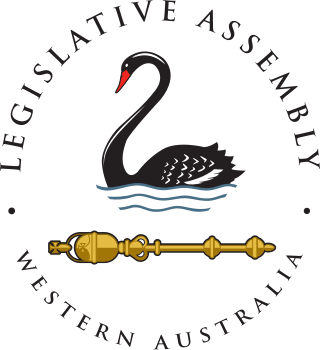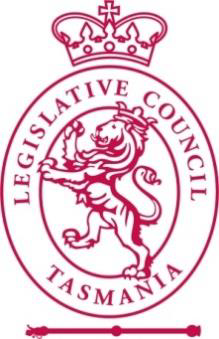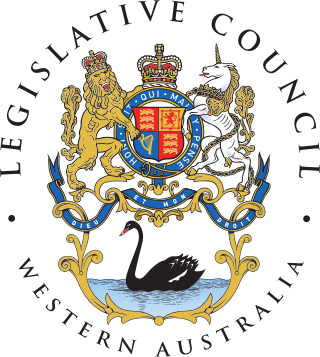
The Australian Democrats is a centrist political party in Australia. Founded in 1977 from a merger of the Australia Party and the New Liberal Movement, both of which were descended from Liberal Party dissenting splinter groups, it was Australia's largest minor party from its formation in 1977 through to 2004 and frequently held the balance of power in the Senate during that time.

The Country Liberal Party of the Northern Territory (CLP), commonly known as the Country Liberals, is a centre-right political party in Australia's Northern Territory. In local politics it operates in a two-party system with the Australian Labor Party (ALP). It also contests federal elections as an affiliate of the Liberal Party of Australia and National Party of Australia, the two partners in the federal coalition.
A filibuster is a political procedure in which one or more members of a legislative body prolong debate on proposed legislation so as to delay or entirely prevent decision. It is sometimes referred to as "talking a bill to death" or "talking out a bill", and is characterized as a form of obstruction in a legislature or other decision-making body.

The Senate is the upper house of the bicameral Parliament of Australia, the lower house being the House of Representatives. The composition and powers of the Senate are established in Chapter I of the Constitution of Australia. There are a total of 76 senators: 12 are elected from each of the six Australian states regardless of population and 2 from each of the two autonomous internal Australian territories. Senators are popularly elected under the single transferable vote system of proportional representation.

The Victorian Legislative Council (VLC) is the upper house of the bicameral Parliament of Victoria, Australia, the lower house being the Legislative Assembly. Both houses sit at Parliament House in Spring Street, Melbourne. The Legislative Council serves as a house of review, in a similar fashion to its federal counterpart, the Australian Senate. Although, it is possible for legislation to be first introduced in the Council, most bills receive their first hearing in the Legislative Assembly.

The Western Australian Legislative Assembly, or lower house, is one of the two chambers of the Parliament of Western Australia, an Australian state. The Parliament sits in Parliament House in the Western Australian capital, Perth.

The Legislative Council, or upper house, is one of the two chambers of the Parliament of South Australia. Its central purpose is to act as a house of review for legislation passed through the lower house, the House of Assembly. It sits in Parliament House in the state capital, Adelaide.

The Tasmanian Legislative Council is the upper house of the Parliament of Tasmania in Australia. It is one of the two chambers of the Parliament, the other being the House of Assembly. Both houses sit in Parliament House in the state capital, Hobart. Members of the Legislative Council are often referred to as MLCs.

The Family First Party was a conservative political party in Australia which existed from 2002 to 2017. It was founded in South Australia where it enjoyed its greatest electoral support. Since the demise of the Australian Conservatives into which it merged, it has been refounded in that state as the Family First Party (2021), where it contested the state election in 2022, but failed to win a seat.

Raymond Steele Hall is a former Australian politician who served as the 36th Premier of South Australia from 1968 to 1970. He also served in the federal Parliament as a senator for South Australia from 1974 to 1977 and federal member for the Division of Boothby from 1981 to 1996.
SA First, also known as South Australia First, was a South Australian political party formed in 1999 by dissident Labor MP Terry Cameron. The party contested the 2002 state election but failed to elect any candidates to the Parliament of South Australia.

The Parliament of South Australia is the bicameral legislature of the Australian state of South Australia. It consists of the 47-seat House of Assembly and the 22-seat Legislative Council. General elections are held every 4 years, with all of the lower house and half of the upper house filled at each election. It follows a Westminster system of parliamentary government with the executive branch required to both sit in parliament and hold the confidence of the House of Assembly. The parliament is based at Parliament House on North Terrace in the state capital of Adelaide.

The Unity Party was a small multiculturist party in Australia, formed in 1997 and primarily active in the state of New South Wales. It was formed with the aim of opposing the rise of the controversial anti-immigration politician Pauline Hanson. Although initially billed as a party to unite Australians of all ethnicities against racism, Unity failed to draw significant support outside Australia's East Asian ethnic communities. After the demise of Pauline Hanson as a political force, Unity shifted focus onto ethnic community affairs at a local government level.

The Western Australian Legislative Council is the upper house of the Parliament of Western Australia, a state of Australia. It is regarded as a house of review for legislation passed by the Legislative Assembly, the lower house. The two Houses of Parliament sit in Parliament House in the state capital, Perth.
This is a list of members of the Western Australian Legislative Council between 22 May 2001 and 21 May 2005:
Elizabeth Anne Cunningham is an Australian politician. She was an independent member of the Legislative Assembly of Queensland from 1995 to 2015, representing the electorate of Gladstone. A conservative MLA in a traditionally Labor district, Cunningham is perhaps most well known for having brought Rob Borbidge's Coalition minority government to power in 1996, following the loss of the Mundingburra by-election by the then Goss Labor government.

The 2008 Western Australian state election was held on Saturday 6 September 2008 to elect 59 members to the Legislative Assembly and 36 members to the Legislative Council. The incumbent centre-left Labor Party government, in power since the 2001 election and led since 25 January 2006 by Premier Alan Carpenter, was defeated by the centre-right Liberal Party opposition, led by Opposition Leader Colin Barnett since 6 August 2008.
The 2005 Western Australian state election was held on 26 February 2005.

The 2022 South Australian state election was held on 19 March 2022 to elect members to the 55th Parliament of South Australia. All 47 seats in the House of Assembly, and half the seats in the Legislative Council were up for re-election.
The 2025 Western Australian state election is scheduled to be held on 8 March 2025 to elect members to the Parliament of Western Australia, where all 59 seats in the Legislative Assembly and all 37 seats in the Legislative Council will be up for election.












